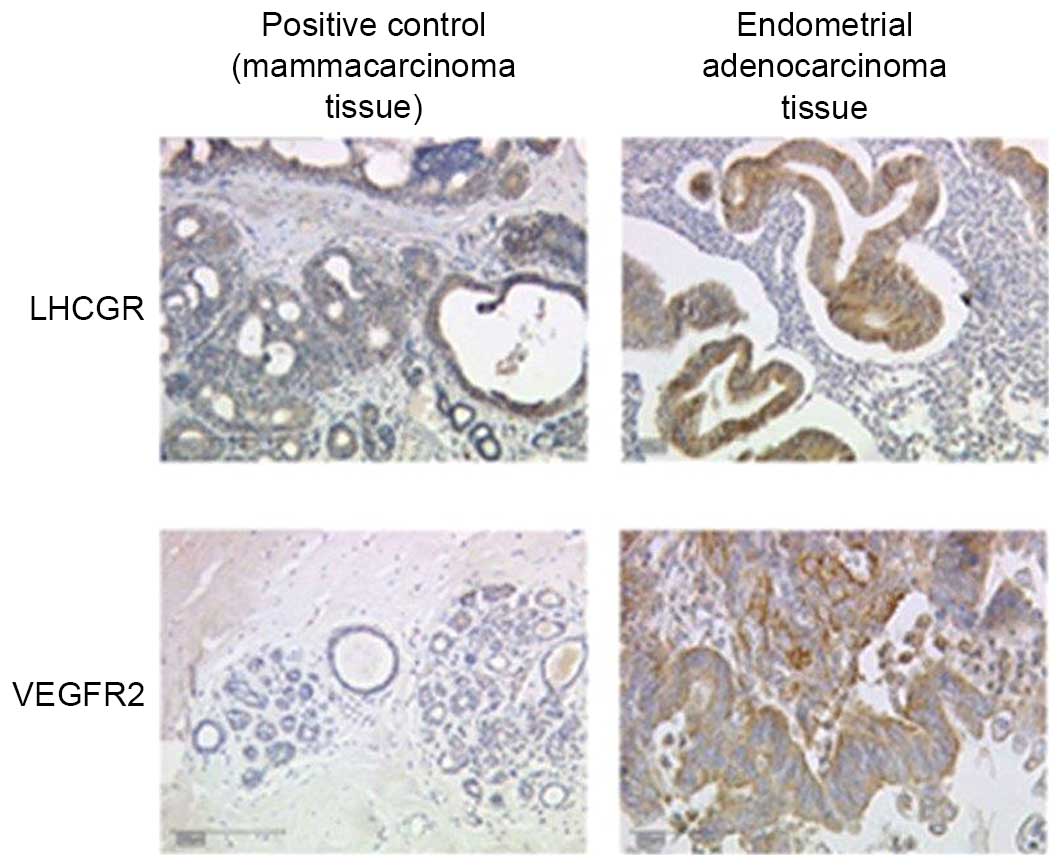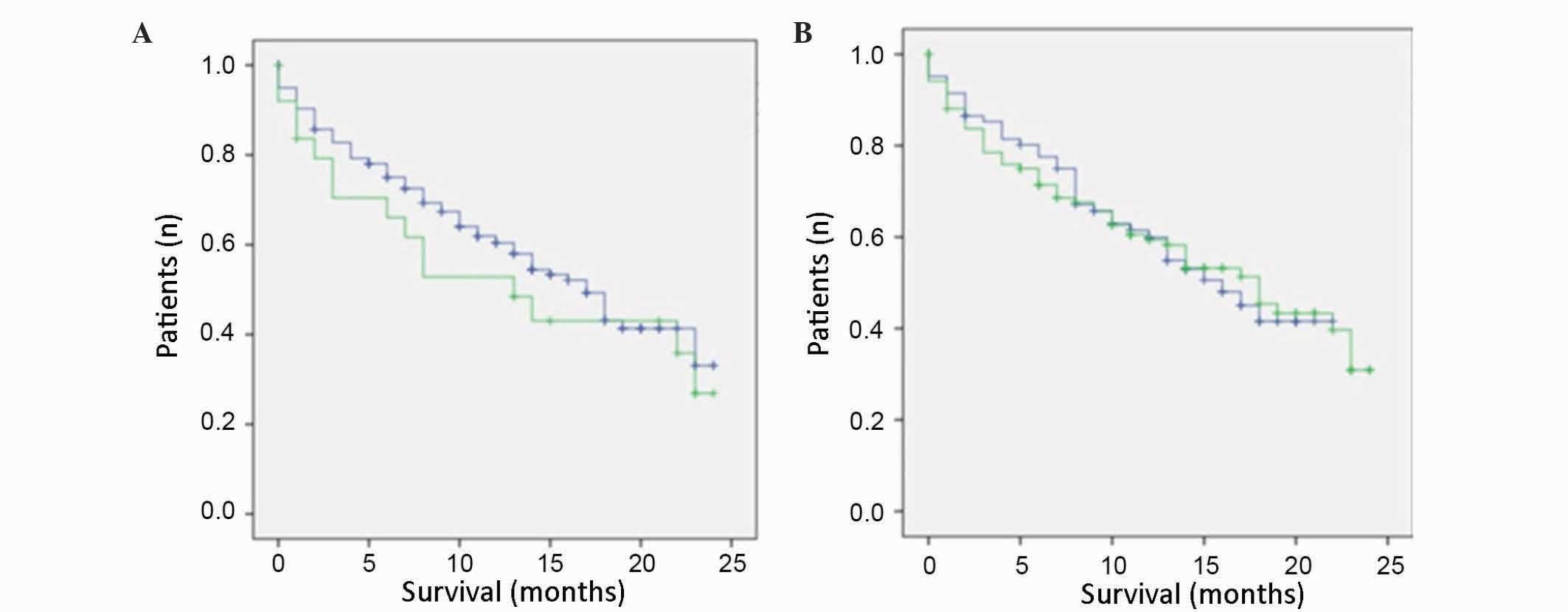|
1
|
AGO: Empfehlungen für Diagnostik und
Therapie des Endometriumkarzinoms-Aktualisierte Empfehlungen der
Kommission Uterus auf Grundlage der S2k Leitlinie (V1.0, 1.6.2008).
AWMF Leitlinien Register Nr 0320/342013.
|
|
2
|
GEKID: Cancer in Germany 2005/2006.
Incidence and Trends. 2006.
|
|
3
|
Moodley M and Roberts C: Clinical pathway
for the evaluation of postmenopausal bleeding with an emphasis on
endometrial cancer detection. J Obstet Gynaecol. 24:736–741. 2004.
View Article : Google Scholar : PubMed/NCBI
|
|
4
|
Tumorzentrum M: Malignome des Corpus
Uteri. Christian PD Dr..Dannecker PMKaPRK: W. Zuckerschwendt
Verlag. München, Wien, New York: 2007.
|
|
5
|
Amant F, Moerman P, Neven P, Timmerman D,
Van Limbergen E and Vergote I: Treatment modalities in endometrial
cancer. Curr Opin Oncol. 19:479–485. 2007. View Article : Google Scholar : PubMed/NCBI
|
|
6
|
Beckmann K, Iosifidis P, Shorne L,
Gilchrist S and Roder D: Effects of variations in hysterectomy
status on population coverage by cervical screening. Aust N Z J
Public Health. 27:507–512. 2003. View Article : Google Scholar : PubMed/NCBI
|
|
7
|
Latil A, Bièche I, Pesche S, Valéri A,
Fournier G, Cussenot O and Lidereau R: VEGF overexpression in
clinically localized prostate tumors and neuropilin-1
overexpression in metastatic forms. Int J Cancer. 89:167–171. 2000.
View Article : Google Scholar : PubMed/NCBI
|
|
8
|
Martins SF, Garcia EA, Luz MA, Pardal F,
Rodrigues M and Filho AL: Clinicopathological correlation and
prognostic significance of VEGF-A, VEGF-C, VEGFR-2 and VEGFR-3
expression in colorectal cancer. Cancer Genomics Proteomics.
10:55–67. 2013.PubMed/NCBI
|
|
9
|
Raspollini MR, Amunni G, Villanucci A,
Baroni G, Boddi V and Taddei GL: Prognostic significance of
microvessel density and vascular endothelial growth factor
expression in advanced ovarian serous carcinoma. Int J Gynecol
Cancer. 14:815–823. 2004. View Article : Google Scholar : PubMed/NCBI
|
|
10
|
Olsson AK, Dimberg A, Kreuger J and
Claesson-Welsh L: VEGF receptor signalling-in control of vascular
function. Nat Rev Mol Cell Biol. 7:359–371. 2006. View Article : Google Scholar : PubMed/NCBI
|
|
11
|
Jubb AM, Hurwitz HI, Bai W, Holmgren EB,
Tobin P, Guerrero AS, Kabbinavar F, Holden SN, Novotny WF, Frantz
GD, et al: Impact of vascular endothelial growth factor-A
expression, thrombospondin-2 expression, and microvessel density on
the treatment effect of bevacizumab in metastatic colorectal
cancer. J Clin Oncol. 24:217–227. 2006. View Article : Google Scholar : PubMed/NCBI
|
|
12
|
Pierce JG and Parsons TF: Glycoprotein
hormones: Structure and function. Annu Rev Biochem. 50:465–495.
1981. View Article : Google Scholar : PubMed/NCBI
|
|
13
|
Zygmunt M, Herr F, Keller-Schoenwetter S,
Kunzi-Rapp K, Münstedt K, Rao CV, Lang U and Preissner KT:
Characterization of human chorionic gonadotropin as a novel
angiogenic factor. J Clin Endocrinol Metab. 87:5290–5296. 2002.
View Article : Google Scholar : PubMed/NCBI
|
|
14
|
Ji Q, Chen P, Aoyoma C and Liu P:
Increased expression of human luteinizing hormone/human chorionic
gonadotropin receptor mRNA in human endometrial cancer. Mol Cell
Probes. 16:269–275. 2002. View Article : Google Scholar : PubMed/NCBI
|
|
15
|
Lin J, Lei ZM, Lojun S, Rao CV,
Satyaswaroop PG and Day TG: Increased expression of luteinizing
hormone/human chorionic gonadotropin receptor gene in human
endometrial carcinomas. J Clin Endocrinol Metab. 79:1483–1491.
1994. View Article : Google Scholar : PubMed/NCBI
|
|
16
|
Reshef E, Lei ZM, Rao CV, Pridham DD,
Chegini N and Luborsky JL: The presence of gonadotropin receptors
in nonpregnant human uterus, human placenta, fetal membranes, and
decidua. J Clin Endocrinol Metab. 70:421–430. 1990. View Article : Google Scholar : PubMed/NCBI
|
|
17
|
Davies S, Bax CM, Chatzaki E, Chard T and
Iles RK: Regulation of endometrial cancer cell growth by
luteinizing hormone (LH) and follicle stimulating hormone (FSH). Br
J Cancer. 83:1730–1734. 2000. View Article : Google Scholar : PubMed/NCBI
|
|
18
|
Pike MC, Peters RK, Cozen W, Probst-Hensch
NM, Felix JC, Wan PC and Mack TM: Estrogen-progestin replacement
therapy and endometrial cancer. J Natl Cancer Inst. 89:1110–1116.
1997. View Article : Google Scholar : PubMed/NCBI
|
|
19
|
Noci I, Pillozzi S, Lastraioli E, Dabizzi
S, Giachi M, Borrani E, Wimalasena J, Taddei GL, Scarselli G and
Arcangeli A: hLH/hCG-receptor expression correlates with in vitro
invasiveness in human primary endometrial cancer. Gynecol Oncol.
111:496–501. 2008. View Article : Google Scholar : PubMed/NCBI
|
|
20
|
Jankowska AG, Andrusiewicz M, Fischer N
and Warchol PJ: Expression of hCG and GnRHs and their receptors in
endometrial carcinoma and hyperplasia. Int J Gynecol Cancer.
20:92–101. 2010. View Article : Google Scholar : PubMed/NCBI
|
|
21
|
Noci I, Borri P, Bonfirraro G, Chieffi O,
Arcangeli A, Cherubini A, Dabizzi S, Buccoliero AM, Paglierani M
and Taddei GL: Longstanding survival without cancer progression in
a patient affected by endometrial carcinoma treated primarily with
leuprolide. Br J Cancer. 85:333–336. 2001. View Article : Google Scholar : PubMed/NCBI
|
|
22
|
Krasnow JS, Berga SL, Guzick DS, Zeleznik
AJ and Yeo KT: Vascular permeability factor and vascular
endothelial growth factor in ovarian hyperstimulation syndrome: A
preliminary report. Fertil Steril. 65:552–555. 1996. View Article : Google Scholar : PubMed/NCBI
|
|
23
|
Neulen J, Yan Z, Raczek S, Weindel K, Keck
C, Weich HA, Marmé D and Breckwoldt M: Human chorionic
gonadotropin-dependent expression of vascular endothelial growth
factor/vascular permeability factor in human granulosa cells:
Importance in ovarian hyperstimulation syndrome. J Clin Endocrinol
Metab. 80:1967–1971. 1995. View Article : Google Scholar : PubMed/NCBI
|
|
24
|
Robertson D, Selleck K, Suikkari AM,
Hurley V, Moohan J and Healy D: Urinary vascular endothelial growth
factor concentrations in women undergoing gonadotrophin treatment.
Hum Reprod. 10:2478–2482. 1995. View Article : Google Scholar : PubMed/NCBI
|
|
25
|
Koistinen H, Hautala LC, Seppälä M,
Stenman UH, Laakkonen P and Koistinen R: The role of glycodelin in
cell differentiation and tumor growth. Scand J Clin Lab Invest.
69:452–459. 2009. View Article : Google Scholar : PubMed/NCBI
|
|
26
|
Ohta K, Maruyama T, Uchida H, Ono M,
Nagashima T, Arase T, Kajitani T, Oda H, Morita M and Yoshimura Y:
Glycodelin blocks progression to S phase and inhibits cell growth:
A possible progesterone-induced regulator for endometrial
epithelial cell growth. Mol Hum Reprod. 14:17–22. 2008. View Article : Google Scholar : PubMed/NCBI
|
|
27
|
Shabani N, Kuhn C, Kunze S, Schulze S,
Mayr D, Dian D, Gingelmaier A, Schindlbeck C, Willgeroth F, Sommer
H, et al: Prognostic significance of estrogen receptor alpha
(ERalpha) and beta (ERbeta), progesterone receptor A (PR-A) and B
(PR-B) in endometrial carcinomas. Eur J Cancer. 43:2434–2444. 2007.
View Article : Google Scholar : PubMed/NCBI
|
|
28
|
Remmele W and Stegner HE: Recommendation
for uniform definition of an immunoreactive score (IRS) for
immunohistochemical estrogen receptor detection (ER-ICA) in breast
cancer tissue. Pathologe. 8:138–140. 1987.(In German). PubMed/NCBI
|
|
29
|
Fan X, Krieg S, Kuo CJ, Wiegand SJ,
Rabinovitch M, Druzin ML, Brenner RM, Giudice LC and Nayak NR: VEGF
blockade inhibits angiogenesis and reepithelialization of
endometrium. FASEB J. 22:3571–3580. 2008. View Article : Google Scholar : PubMed/NCBI
|
|
30
|
Wang J, Taylor A, Showeil R, Trivedi P,
Horimoto Y, Bagwan I, Ewington L, Lam EW and El-Bahrawy MA:
Expression profiling and significance of VEGF-A, VEGFR2, VEGFR3 and
related proteins in endometrial carcinoma. Cytokine. 68:94–100.
2014. View Article : Google Scholar : PubMed/NCBI
|
|
31
|
de Carvalho Fraga CA, Farias LC, de
Oliveira MV, Domingos PL, Pereira CS, Silva TF, Roy A, Gomez RS, de
Paula AM and Guimarães AL: Increased VEGFR2 and MMP9 protein levels
are associated with epithelial dysplasia grading. Pathol Res Pract.
210:959–964. 2014. View Article : Google Scholar : PubMed/NCBI
|
|
32
|
Kampmann E, Altendorf-Hofmann A, Gibis S,
Lindner LH, Issels R, Kirchner T and Knösel T: VEGFR2 predicts
decreased patients survival in soft tissue sarcomas. Pathol Res
Pract. 211:726–730. 2015. View Article : Google Scholar : PubMed/NCBI
|
|
33
|
Higgins KJ, Liu S, Abdelrahim M, Yoon K,
Vanderlaag K, Porter W, Metz RP and Safe S: Vascular endothelial
growth factor receptor-2 expression is induced by 17beta-estradiol
in ZR-75 breast cancer cells by estrogen receptor alpha/Sp
proteins. Endocrinology. 147:3285–3295. 2006. View Article : Google Scholar : PubMed/NCBI
|
|
34
|
Higgins KJ, Liu S, Abdelrahim M,
Vanderlaag K, Liu X, Porter W, Metz R and Safe S: Vascular
endothelial growth factor receptor-2 expression is down-regulated
by 17beta-estradiol in MCF-7 breast cancer cells by estrogen
receptor alpha/Sp proteins. Mol Endocrinol. 22:388–402. 2008.
View Article : Google Scholar : PubMed/NCBI
|
|
35
|
Gargett CE, Zaitseva M, Bucak K, Chu S,
Fuller PJ and Rogers PA: 17Beta-estradiol up-regulates vascular
endothelial growth factor receptor-2 expression in human myometrial
microvascular endothelial cells: Role of estrogen receptor-alpha
and- beta. J Clin Endocrinol Metab. 87:4341–4349. 2002. View Article : Google Scholar : PubMed/NCBI
|
|
36
|
Yuri T, Kinoshita Y, Emoto Y, Yoshizawa K
and Tsubura A: Human chorionic gonadotropin suppresses human breast
cancer cell growth directly via p53-mediated mitochondrial
apoptotic pathway and indirectly via ovarian steroid secretion.
Anticancer Res. 34:1347–1354. 2014.PubMed/NCBI
|
|
37
|
Brokken LJ, Lundberg-Giwercman Y, De-Meyts
Rajpert E, Eberhard J, Ståhl O, Cohn-Cedermark G, Daugaard G, Arver
S and Giwercman A: Association of polymorphisms in genes encoding
hormone receptors ESR1, ESR2 and LHCGR with the risk and clinical
features of testicular germ cell cancer. Mol Cell Endocrinol.
351:279–285. 2012. View Article : Google Scholar : PubMed/NCBI
|
|
38
|
Kundu S, Pramanick K, Paul S,
Bandyopadhyay A and Mukherjee D: Expression of LH receptor in
nonpregnant mouse endometrium: LH induction of 3β-HSD and de novo
synthesis of progesterone. J Endocrinol. 215:151–165. 2012.
View Article : Google Scholar : PubMed/NCBI
|
|
39
|
Yung Y, Maman E, Ophir L, Rubinstein N,
Barzilay E, Yerushalmi GM and Hourvitz A: Progesterone antagonist,
RU486, represses LHCGR expression and LH/hCG signaling in cultured
luteinized human mural granulosa cells. Gynecol Endocrinol.
30:42–47. 2014. View Article : Google Scholar : PubMed/NCBI
|
















